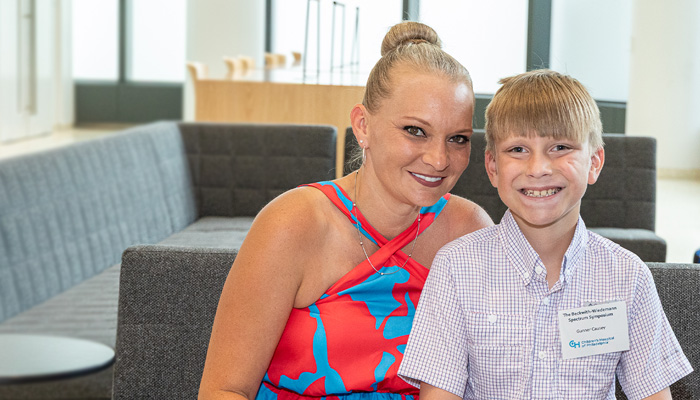HOW CAN WE HELP YOU? Call 1-800-TRY-CHOP
Kalish Laboratory Research Overview
The Kalish lab's clinical research focuses on improving care for the clinical features of BWS and understanding the correlations between those manifestations. The lab oversees the BWS registry and biorepository, using clinical data and samples to understand the transition between normal growth, overgrowth, and cancer. Through this work, the lab continues to develop national management guidelines for BWS.
Its translational research focuses on how epigenetic and genetic changes lead to the features of BWS including overgrowth and cancer, with goals of understanding these mechanisms and developing therapeutics.

BWS is the most common cancer predisposition and growth disorder that leads to cancer in children. Children with BWS can develop overgrowth of a number of different organs and in some cases develop tumors, most commonly hepatoblastoma (liver cancer) and/or Wilms tumor (kidney cancer). Some of the same genetic and epigenetic changes that cause BWS are also seen in other types of cancer; studying BWS provides a window into understanding the larger questions about growth and the transition to cancer.
Researchers are identifying pathways promoting the preterm birth of BWS children using combinational approaches, placental samples, and IPSC modeling.
Some children are identified as having a predetermined risk for cancer. Children who are identified as being predisposed to cancer are typically screened in a variety of different ways for different disorders, and families are also offered genetic counseling. However, very few of the cancer surveillance protocols are used consistently by similar programs around the world, so an international consensus needs to be developed to ensure uniform cancer surveillance and communication among cancer predisposition programs.
Garrett Brodeur, MD, Director of the Cancer Predisposition Program at CHOP, is organizing an International Workshop on Pediatric Cancer Predisposition sponsored by the American Association for Cancer Research. This workshop of thought leaders from around the world will develop position papers for the major cancer predisposition syndromes affecting children. The papers will contain the major manifestations of the disorder, the genes known to be responsible, the relative cancer risk in children and adolescents (up to 20 years old), and the recommended cancer surveillance protocols for patients with these disorders. This work will facilitate communication across teams and institutions, ensure seamless care for children who go for treatment at more than one center, and serve as a standard of care for insurance purposes.
Researchers are trying to understand the connections between BWS-driven liver growth and changes in metabolic signaling, using patient biopsies, organoid models, and engineered induced pluripotent stem cells.
Researchers are examining Beckwith-Wiedemann Spectrum kidneys, using single-cell sequencing technologies, patient biopsies, and induced pluripotent stem cell modeling to identify dysregulated pathways that may be targeted in future studies.
Researchers are querying which cell types are contributing to macroglossia in Beckwith-Wiedemann Spectrum, as well as which internal and external signaling pathways are promoting tongue overgrowth.
Genes that are subject to genomic imprinting are exclusively expressed from either maternal or paternal chromosomes, but not both, during normal development. Mutations or defects in epigenetic regulatory mechanisms sometimes disrupt normal imprinted gene expression. Abnormal imprinted gene expression can give rise to rare developmental growth disorders such as Beckwith-Wiedemann syndrome (BWS). While disease severity varies over a wide spectrum for BWS, tissue from patients with BWS frequently exhibits "phenotypic mosaicism," a phenomenon in which cells from different organs exhibit dysregulated imprinted gene regulation to varying degrees.
Researchers at the Center for Childhood Cancer Research (CCCR) are studying the underlying cellular and molecular mechanisms that contribute to the epigenetic mosaicism characteristic of patients with BWS. To accomplish this, CCCR researchers in collaboration with researchers at the University of Pennsylvania are applying a new fluorescence hybridization technique that measures allele-specific expression in single cells. Results from these experiments revealed that imprinting disorders can display striking single-cell heterogeneity in molecular phenotype and that this heterogeneity may underlie the epigenetic mosaicism characteristic of human imprinting gene disorders.
Additional experiments are underway to determine whether or not this assay is applicable to human cell lines derived from patients with BWS and other human imprinting gene disorders.
Beckwith-Wiedemann syndrome (BWS) is a rare pediatric genetic disorder characterized by general body overgrowth and increased predisposition to developing cancer including hepatoblastomas and Wilms tumors. BWS can be caused by genetic and/or epigenetic changes on human chromosome 11 which have also been associated with the development of breast and colon cancers.
Researchers at the Center for Childhood Cancer Research are studying the genetic and epigenetic mechanisms that contribute to the increased risk of some children with BWS developing cancer. Using induced and differentiated pluripotent human stem cell lines (derived from patients with BWS), researchers will use molecular profiling and whole genome analysis to identify possible cellular pathways that contribute to tumorigenesis in BWS patients. Also, researchers will work with novel animal models of BWS to evaluate the roles of two independently regulated genes on chromosome 11 in BWS tumor formation and growth.
The results from these two lines of research will provide insights into the genetic and/or epigenetic mechanisms that increase the risk of cancer in children with BWS.
CHOP has started a Beckwith-Wiedemann Syndrome (BWS) and 11p Overgrowth Spectrum patient registry to systematically study the many unanswered questions facing children and families with these conditions. By gathering and storing clinical data and blood and tissue samples from patients, we hope to improve our understanding of the BWS spectrum. Any infant, child, or adult presenting with a disorder of growth that is suggestive of the BWS spectrum will be eligible to participate. The registry repository is an ongoing effort. Please contact us at BWS@chop.edu for more information.